- Home
- Joy Fielding
See Jane Run Page 7
See Jane Run Read online
Page 7
She nodded, moving closer to his side as he reached into his pocket to pull out their certificate of marriage. “It says we got married in Connecticut,” she noted, aware of the warmth emanating from his body.
“That’s where you were from. Your mother still lived there.”
“And my father?”
“He died when you were thirteen years old.”
She felt instantly saddened, not because her father had died when she was still in her formative years, but because she had no recollection of his ever having lived. She felt doubly abandoned. “How did I end up in Boston?”
He grinned. “You married me.”
She bit her lip, not ready yet to discuss their life together. She needed to digest more facts about herself first, to come to their marriage with some sense of personal history.
“Would you like to see a copy of your passport?” he asked, offering it forward, as if it were a piece of evidence and this hospital room a court of law.
Her eyes quickly scanned the small booklet, noting that her maiden name was Lawrence, that her physical description matched with what she had discovered about herself, and that the photograph at the bottom, while far from flattering—she had the look of a frightened doe caught in the glare of a car’s headlights—was unmistakably a picture of herself. “Do you have more photographs?” she asked, knowing he had.
He drew several snapshots out of his pants pocket. Her body inched closer to his side, so that their arms were touching as he held out the photographs for her to see.
The first picture was of the two of them carousing on a beach. He was tanned; she was just slightly less so. Both wore modestly attractive black bathing suits, and both looked as if they were having trouble keeping their hands off one another.
“Where was this taken?” she asked.
“On the Cape. At my parents’ cottage. About five years ago,” he continued, knowing this would be her next question. “That was when we still believed that the sun couldn’t be anything but good for us. Your hair was a little longer then. I was probably a few pounds thinner.”
“You don’t look like you’ve put on any weight.” She felt instantly self-conscious, as if she had trespassed onto too personal ground. She quickly turned her attention to the second photograph.
Again the two of them faced the camera smiling, their arms locked tightly around one another’s waist. This time, however, they were in more formal attire, he in a dinner jacket and black tie, she in a dark-pink evening dress. “This is more recent,” she stated, her mind registering the passage of the years.
“It was taken at Christmas. We were at a hospital dance.”
“We look very happy,” she marveled.
“We were very happy,” he said with emphasis, then more softly, less assuredly, “I know we will be again.”
She closed her hands over the photographs and returned them to him, along with their marriage certificate and her passport. Then she walked back to the window, staring out at the street below before turning again to the stranger to whom she had been married—apparently very happily—for the past eleven years.
“So I grew up in Connecticut,” she said after a long silence.
“You lived there until you went away to college.”
“What was my major, do you know?”
He smiled. “Of course I know. It was English. You graduated at the top of your class.”
“And after I graduated?”
“Well, you found out that there weren’t a whole lot of jobs out there that specifically required a degree in English literature, and you didn’t want to teach, so you eventually got a job at Harvard Press.”
“In Boston?”
“Cambridge.”
“Why didn’t I go back to Connecticut, or head for New York?”
“Well, I like to think I had something to do with that decision.”
She turned back toward the window, still not ready to discuss their life together. “What about my brother?”
He seemed startled by the question. “Tommy? What about him?”
“How old is he? What does he do? Why is he in San Diego?”
“He’s thirty-six,” he began, calmly answering her questions in order. “He owns a yacht dealership, and he’s been living in San Diego for the past ten years.”
“Is he married?”
“Yes. Actually it’s his second marriage. His wife’s name is Eleanor and I’m not exactly sure how long they’ve been married.”
“Do they have children?”
“Two small boys. I’m embarrassed to admit I don’t know how old.”
“So I’m an auntie.”
“That you are.”
“What else am I?” she asked suddenly, the question popping from her mouth before she could stop it.
“I’m not sure I understand.”
She swallowed hard, as if she could force the question she had been avoiding back into her gut. “I’m an auntie,” she repeated, gathering her strength. “Am I also … a mother?”
“Yes,” he said, with something approaching eloquence.
“Oh, God!” Her voice was a low moan. How could she forget she had a child? What kind of mother did that make her? “Oh, God.” She felt her body folding in on itself, like an accordion. Her arms wrapped around her shaking frame and her head fell forward.
“It’s okay. It’s okay,” he whispered, his voice a salve, coating her, protecting her. She felt his arms guiding her back into an upright stance. She buried her head against the warmth of his chest, hearing his heart beat loudly, understanding he was as frightened as she was.
He let her cry uninterrupted for several minutes, stroking her back as if she were a child. Her cries shuddered to a halt. “How many children do we have?” she asked so quietly that she had to clear her throat and repeat the question.
“Just one. A little girl. Emily.”
“Emily,” she repeated, savoring the name, as if it were wine on the tip of her tongue. “How old is she?”
“Seven.”
“Seven,” she whispered wonderingly. “Seven.”
“She’s with my parents,” he said. “I thought it might be wiser, until things got straightened out, that she stay with them.”
“Oh, thank you!” Her tears of shame became tears of relief. “I just don’t think it would be a good idea for me to see her yet, or for her to see me.”
“I understand.”
“It would be so awful for her to have to look at her mother knowing that her mother didn’t recognize her. I can’t imagine anything more frightening for a child.”
“It’s all taken care of,” he assured her. “They’ve taken her to the cottage. She can stay with them all summer as far as they’re concerned.”
She cleared her throat again, wiping several stubborn tears away from her cheeks. “When did you arrange all this?”
He shrugged, his hands lifting from his sides, palms up, into the air. “It just sort of worked itself out,” he said, as if acknowledging that he had no control over any aspect of his life at the moment. “We’d already planned for Emily to spend the time with my parents while you were in San Diego …” His words trailed off, like a windup toy running out of steam.
“Tell me more about myself,” she urged.
“What would you like to know?”
“The good things,” she said immediately.
He didn’t hesitate. “Well, let’s see. You’re bright, determined, funny …”
“I’m funny?”
“You have a wonderful sense of humor.”
She smiled gratefully.
“You’re a great cook, a terrific companion, a loyal friend.”
“I sound too good to be true.”
“You couldn’t sing on key if your life depended on it,” he continued, laughing, “and you love to sing.”
“That’s my worst fault?”
“When you’re angry, you turn into the Devil Girl from Mars.”
“I have a temper?
”
He grinned sheepishly. “You were always very good at understatement. Yes,” he agreed, after a pause, “you have a temper.”
She digested this piece of information, then went on. “What’s my favorite color, my favorite food?”
“Blue,” he answered easily. “Anything Italian.”
“Do I have a career? You said I worked for a few years in publishing.” The questions were coming faster now, one following doggedly on the heels of the question before it.
“You gave up working full-time when Emily was born. I was able to convince you to come and work for me a few days a week only after Emily was in school all day.”
“I work for you?”
“Tuesdays and Thursdays. Answering my phone, taking care of my correspondence, occasionally rearranging my files.”
“Sounds very fulfilling.”
She hadn’t meant for the words to carry such a sarcastic edge, so she was grateful when he declined to take offense. “Actually, you took the job primarily as a way for us to spend more time together. I have a very busy practice, and my hours aren’t always dependable. We wanted to make sure we didn’t lose the closeness we’d always had. This way, we knew we had Tuesdays and Thursdays together. I’m in the operating room the other days.”
“Sounds like the perfect marriage.”
“Well, nothing’s perfect.” He paused. “We’ve had our share of arguments, just like everybody else, but on balance, I think we’d both agree we had something pretty special.”
She found herself aching to believe him. “Where do we live? Beacon Hill?”
He smiled. “No, we decided the city wasn’t a great place to raise a family. We have a very nice house in Newton.”
She recognized Newton as a well-to-do suburb of Boston, no more than a twenty-minute highway drive away.
“Would you like to go there?” he was asking.
“Now?”
He gently touched the sides of her arms. She felt a current, like an electrical charge, travel along her skin to the base of her brain. “Trust me, Jane,” he said gently. “I love you.”
She looked into his kind face, saw his commitment to her reflected in his eyes, and longed to tell him she loved him in return, but how could she love someone she didn’t know? Instead, she reached up to gently touch his lips, feeling them instantly kiss the tips of her fingers. “I trust you,” she said.
SIX
“SORRY about the traffic,” he apologized, as if he could be held accountable for the line of cars that crawled along Highway 9 at a speed of no more than twenty miles an hour.
“There must be an accident up ahead,” Jane said matter-of-factly, not saying what she really felt, that anything that delayed her reentry into her past life, a life she remained totally unaware of, was welcome, indeed preferred. She caught him looking at her strangely. “What?” she asked, feeling frightened, though she wasn’t sure why.
“Nothing,” he answered quickly.
“No, there’s something. I could see it in your eyes.”
He paused, pretending to be studying the traffic. “I was just thinking that if this were more normal times,” he began self-consciously, “then you’d be reaching across the steering wheel to honk the horn.”
“I’d be reaching across the steering wheel to honk the horn when you were driving?!” Her tone was incredulous.
“You’ve done it before.”
“I’m that impatient?”
“You always liked to get where you were going as quickly as possible. Traffic was one of those things that drove you crazy,” he continued, speaking of her in the past tense, as if she were newly deceased.
“Why was I always in such a hurry?”
“That’s just the way you are,” he said simply, returning her to the here and now.
“Tell me about you,” she said.
“What would you like to know?”
“Everything.”
He smiled, his lips forming an easy, relaxed upward curve. She studied his face as he pondered where to begin. In profile, the wayward slant of his nose was more pronounced, and his forehead was all but hidden by a curtain of hair that fell unmolested into his eyes, creating an impression of casual disregard for his appearance. Still, Dr. Michael Whittaker managed to retain an air of dignified authority, an aura that she knew encouraged respect from others no matter what the occasion or how he was dressed. It was a feat few would be capable of, and one that he performed effortlessly, probably because it was something he was unaware of.
“Well, let’s see,” he began, relaxing back into the black leather of the front seat of his black BMW. “I was born and raised in Weston, not ten minutes away from where we live now. I had a happy childhood,” he said, laughing. “Is this the sort of thing you want?”
“Exactly. Were you an only child?”
“I had a brother.”
“Had?”
“He died when I was in high school. Actually,” he continued before she could interrupt with more questions, “I never really knew my brother. He was four years older than I was and was born with a wide variety of congenital deformities. He had to be institutionalized at birth.”
“I’m so sorry,” she told him, and she was.
“It all happened a very long time ago.” He shrugged. “And like I said, he was never really a part of my life. By the time I came along, my parents had pretty much adjusted to his absence, so I grew up completely doted upon—you know, the classic cliché of the only child who has everything.”
“Including the total responsibility for his parents’ happiness,” Jane said, understanding the situation without needing to hear it in so many words.
He regarded her with a mixture of surprise and respect. “It’s reassuring to see that in some ways you haven’t changed at all.”
“Meaning?”
“That’s exactly what the old Jane would have said.”
“The old Jane,” she repeated, and laughed, the nervous laugh of one not sure how else to react. “Tell me about your parents,” she encouraged.
“My father was a brilliant scientist.” It was his turn to laugh. “Are there any other kind? Anyway, he’s retired now, but when I was a child, he was very caught up in his work. I don’t remember him being around much, so my mother did a lot of overcompensating.” He seemed lost temporarily in images of the past. “My father used to say that if he’d let my mother have her way, she would have nursed me until I was five years old.”
“But she didn’t.”
“Not that I can remember. We did take baths together, however, until I was, oh, in second grade.” He grinned, the self-satisfied smile of Alice’s Cheshire cat. “I do remember that.”
“She was probably anxious to keep you a baby for as long as she could,” Jane said, thinking out loud. “Because of your brother.”
“I guess we were all more affected by his condition than any of us realized. I mean, my brother’s undoubtedly the reason I went into medicine, why I specialized in pediatric surgery. Most of what I do in my practice involves kids who are deformed in some way or another, cleft palates, disfigurements of various kinds. Anyway,” he continued after a long pause, “I was accepted into Harvard Medical School, which was great because it meant I didn’t have to go out of state, and Harvard was expensive enough, even on a partial scholarship.” Another wide, unexpected grin flashed across his face. For an instant, he looked and sounded just like a teenager. “This is great. I haven’t talked about this stuff in years. It’s like we’re getting to know each other all over again.”
“Tell me about our first date. Tell me how we met.”
“We were fixed up.”
“By whom?”
“I guess it was a mutual friend. Yeah, it was Marci Tanner. Good old Marci Tanner. I wonder whatever happened to her. She was on her third husband and living somewhere in South America last we heard from her.”
“And it was love at first sight?”
“Are you kidding? We hated eac
h other! Hated, loathed, despised!”
She tried, but failed, to keep the surprise out of her face. Instinctively, she moved closer to the window, as if to put greater distance between a man she could have hated, loathed, despised on sight approximately a dozen years ago.
“I had just had my heart broken by some beautiful young thing,” he explained, “and you had had your fill of egotistical young doctors. We were both very wary. We went to a party. I even remember what you wore! It was a gray dress with a little pink bow at the collar. I thought you were as cute as hell. But having just had my heart broken by another cute young thing, I wasn’t about to rush into another relationship, and I probably made that as clear as I could as fast as I could. ‘Hi there, I’m Dr. Michael Whittaker and I have no intention of getting involved at this point in time, so admire me from afar, but don’t get your hopes up.’”
She laughed. “Somehow that doesn’t sound like you.” She relaxed into her former position, lulled by the sound of his voice.
“We couldn’t agree on a thing. I liked action movies; you only went to foreign films. I loved beer and salami sandwiches; you preferred wine and cheese. You were into classical music; my thing was rhythm and blues. You liked to spend hours talking literature, and the only book I knew anything about was Gray’s Anatomy. I was a sports fanatic, and you didn’t know the Boston Celtics from the Boston Red Sox.”
“Somewhere along the way, we obviously made peace.”
“It took a while. We spent most of that first evening waiting for the other to make some huge gaffe, the kind of mistake that could justify the other’s storming off the premises. But we didn’t. And then we found ourselves dancing together. It was a slow dance, a real oldie, Johnny Mathis singing ‘The Twelfth of Never,’ of all things. And I think that’s what did it.”
“Chemistry over common sense,” she noted with a smile.
“Maybe in the beginning. But after a while, I found I got used to subtitles and you discovered that salami sandwiches weren’t so bad after all. You even learned to tell the difference between a hockey puck and a basketball, so how could I not love you? And I learned that there was more to literature than the latest medical journal, so how could you resist falling in love with me?”

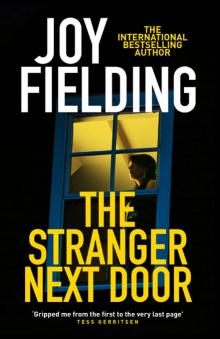 The Stranger Next Door
The Stranger Next Door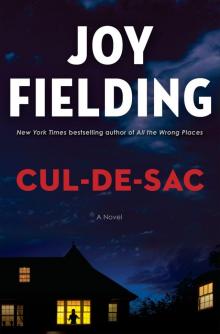 Cul-de-sac
Cul-de-sac The Final Act
The Final Act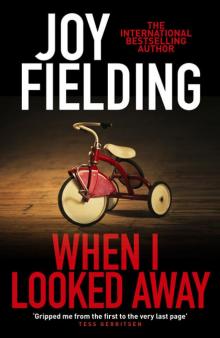 When I Looked Away
When I Looked Away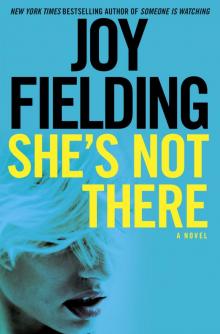 She's Not There
She's Not There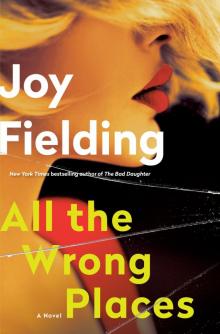 All the Wrong Places
All the Wrong Places Now You See Her
Now You See Her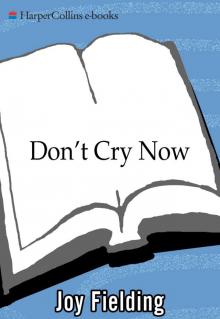 Don't Cry Now
Don't Cry Now Good Intentions
Good Intentions Still Life
Still Life Lost
Lost The First Time
The First Time Whispers and Lies
Whispers and Lies The Other Woman
The Other Woman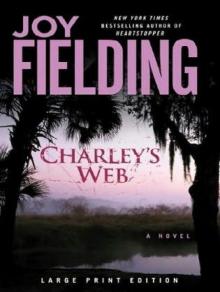 Charley's Web
Charley's Web Mad River Road
Mad River Road Puppet
Puppet Life Penalty
Life Penalty The Wild Zone
The Wild Zone Home Invasion
Home Invasion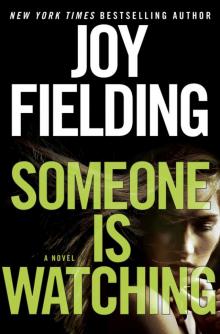 Someone Is Watching
Someone Is Watching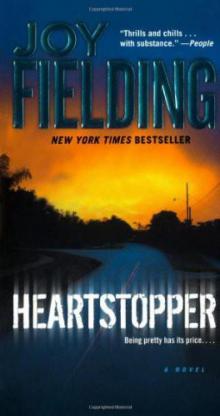 Heartstopper
Heartstopper See Jane Run
See Jane Run The Bad Daughter
The Bad Daughter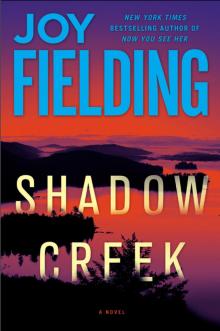 Shadow Creek
Shadow Creek Missing Pieces
Missing Pieces Kiss Mommy Goodbye
Kiss Mommy Goodbye Grand Avenue
Grand Avenue